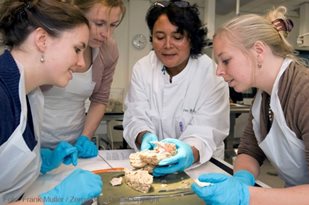16 April 2020
o Pipette or Biostatistics
o RT-PCR or Proteomics
o Big data or Clinical trial


Where do you live and with whom?
I live in Nijmegen with my husband Frank-Erik de Leeuw (Neurologist, Radboudumc) and my two youngest sons Constantijn and Pepijn (oldest son Lodewijk left home).When you were a kid what did you want to be when you grew up? Can you tell us something about your child years.
I had a traditional youth: had to go to ballet and play the piano from 5 yrs on. From age 6 till 21 yrs of age I wanted to become a veterinarian after the tv series Daktari with the cross-eyed lion named Clarence, and a chimp named Judy.What was your previous academic training, where did you study and why did you choose that study/those studies?
I studied Biology in Nijmegen (after being excluded twice for Veterinary Medicine) and did my PhD at the Institute for Neurobiology, University of Amsterdam and partly at University of Gothenburg on the innervation of the gut mucosa. Thereafter I did a Post-doc at the Intestinal Disease Research Group, McMaster University, Hamilton, Canada on effect of stress and disease on the intestinal permeability in rat and human. Then I became a theme group leader Neurosciences at Numico (Nutricia) Research Wageningen where I was responsible for writing and coordinating several large research projects on impact of nutrition on the aging brain. In 2003 I moved to Nijmegen Radboudumc to set up the neuroscience research at dept Anatomy and to teach Neuroanatomy.Of which of your research discoveries, you are most proud of?
When I started my research at Radboudumc we had to set up (together with prof Heerschap) the neuroimaging on the 7 and 11.7T scanner in PRIME from scratch, which I needed to investigate the effect of diets on cerebral blood flow, connectivity, and grey/white matter integrity in relation to cognition in mouse brain. Since then, 16 years ago we have successfully performed many (diet) studies in mouse disease models, in which we developed a multicomponent diet for the aging brain which is on the market now. So I am proud of my research group members.What is your most important scientific challenge in the coming 5 years?
To be able to continue the translational mouse studies because it is nearly impossible to get animal studies approved by the ethical animal committees (although we always perform our experiments according to strict guidelines). It takes sometimes a year to be approved which is too much time for 4 years period for PhD canddates. Another challenge is to keep our young scientists in academia. They don’t want a future struggling for project money in part-time jobs and they choose eggs for money.If you could choose any mentor, who would this be?
Professor Mary Perdue, now Professor Emerita and former director of the Intestinal Diseases Research Program from McMaster University, Hamilton Canada. She was my supervisor during my postdoc period at Mc Master. She really educated me in science and also to be more self-confident in the by male scientists dominated research field. She investigated the role of mast cells and bacteria on gut health/permeability and gut brain axis already over 30 years ago. After retirement she became successfully Involved in arts, and has published 2 books of photographs: and still is president of a club for women in arts.What is your favorite topic: molecules - patients - population?
I believe in translational research and am not a clinician, so from mice to men to population. But of course healthcare/patient is the ultimate goal.What should be changed / improved in the scientific community?
More women in science. Criteria to become PI should be changed to avoid competition between researchers and stimulate collaboration.Is there anything we can wake you up for in the middle of the night?
Approval of a project proposal or high impact paper, but also for a glass of Amarone wine with good friends😊What is the thing that irritates you most?
How denigrating some people think about animal research and on top of that dietary research. Low percentage of female professors.Who would you like to have dinner with, if you had the chance?
My deceased father. I would like to ask him about the war in Indonesia where he fought from age 16 years on, first with the English and Gurkha’s against the Japanese and just 2 years later how he freed Dutch women and children from several Japanese camps all by himself. I never asked him when he was alive…How do you relax from the demanding job being a scientist?
Having dinner with friends, stroll with my husband and holidays with the complete family (three sons, the girlfriends and husband).Do you have a tip for our most junior scientists?
Good life-work balance, believe in yourself and stay close to yourself.Please make a selection:
o Crisper-Cas9 or AI,o Pipette or Biostatistics
o RT-PCR or Proteomics
o Big data or Clinical trial
